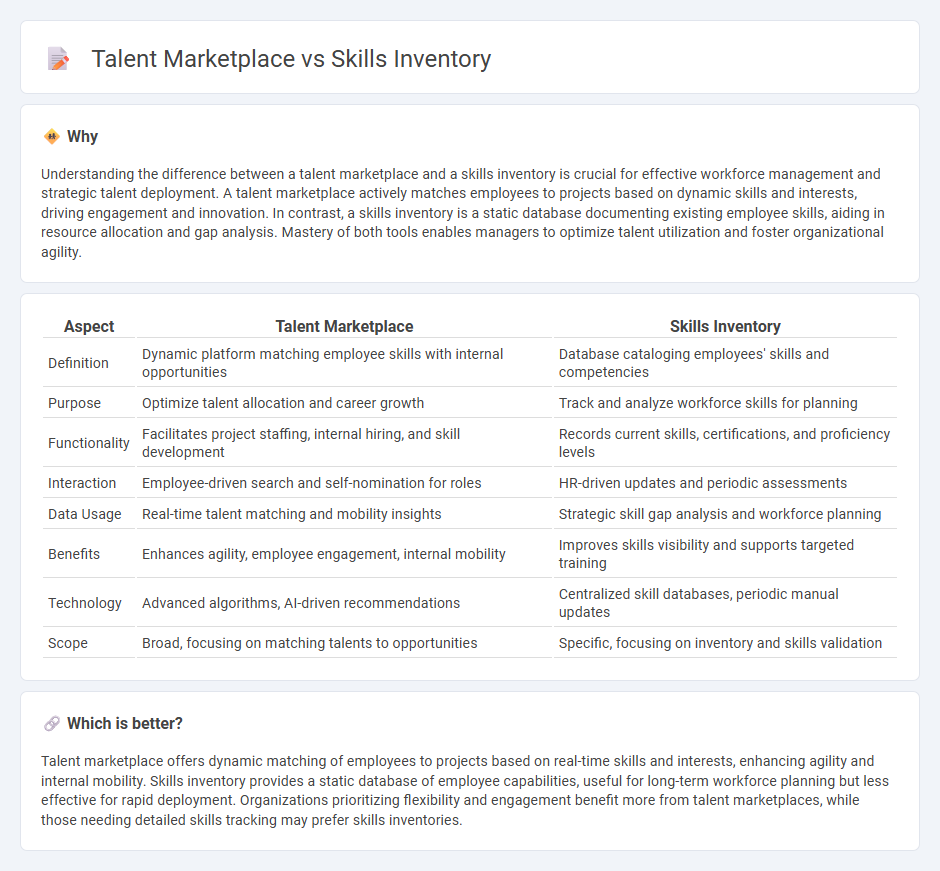
Talent marketplaces connect employees with internal opportunities based on project needs and career goals, fostering dynamic workforce agility and personalized development paths. Skills inventories provide comprehensive databases of employee competencies, enabling data-driven talent management and strategic workforce planning. Explore how integrating both can transform organizational performance and employee engagement.
Why it is important
Understanding the difference between a talent marketplace and a skills inventory is crucial for effective workforce management and strategic talent deployment. A talent marketplace actively matches employees to projects based on dynamic skills and interests, driving engagement and innovation. In contrast, a skills inventory is a static database documenting existing employee skills, aiding in resource allocation and gap analysis. Mastery of both tools enables managers to optimize talent utilization and foster organizational agility.
Comparison Table
| Aspect | Talent Marketplace | Skills Inventory |
|---|---|---|
| Definition | Dynamic platform matching employee skills with internal opportunities | Database cataloging employees' skills and competencies |
| Purpose | Optimize talent allocation and career growth | Track and analyze workforce skills for planning |
| Functionality | Facilitates project staffing, internal hiring, and skill development | Records current skills, certifications, and proficiency levels |
| Interaction | Employee-driven search and self-nomination for roles | HR-driven updates and periodic assessments |
| Data Usage | Real-time talent matching and mobility insights | Strategic skill gap analysis and workforce planning |
| Benefits | Enhances agility, employee engagement, internal mobility | Improves skills visibility and supports targeted training |
| Technology | Advanced algorithms, AI-driven recommendations | Centralized skill databases, periodic manual updates |
| Scope | Broad, focusing on matching talents to opportunities | Specific, focusing on inventory and skills validation |
Which is better?
Talent marketplace offers dynamic matching of employees to projects based on real-time skills and interests, enhancing agility and internal mobility. Skills inventory provides a static database of employee capabilities, useful for long-term workforce planning but less effective for rapid deployment. Organizations prioritizing flexibility and engagement benefit more from talent marketplaces, while those needing detailed skills tracking may prefer skills inventories.
Connection
Talent marketplaces leverage comprehensive skills inventories to match employees with projects that align with their expertise, enhancing workforce agility and productivity. A well-maintained skills inventory provides real-time data on employee capabilities, enabling dynamic talent allocation and personalized development plans. Integrating these systems drives strategic workforce management by optimizing internal talent utilization and closing skill gaps.
Key Terms
Competency Mapping
A skills inventory systematically catalogs employees' skills, qualifications, and experiences to identify competency gaps and support workforce planning. Talent marketplaces dynamically match these competencies with internal project opportunities, fostering agile talent deployment and personalized career development. Explore how integrating competency mapping within talent marketplaces transforms organizational agility and employee growth.
Internal Mobility
Skills inventory catalogs employees' competencies and experience to identify potential fits for new roles within an organization. Talent marketplace platforms actively match these skills to real-time internal job openings, promoting dynamic internal mobility and career growth. Explore how integrating these tools can transform your company's internal talent movement strategies.
Workforce Analytics
Skills inventory systematically catalogs employees' competencies, enabling precise workforce analysis and gap identification, while talent marketplaces dynamically match those skills with project needs for optimized resource allocation. Workforce analytics leverages data from both systems to forecast talent demand, enhance employee development, and improve business agility. Explore how integrating skills inventory and talent marketplace data transforms strategic workforce planning.
Source and External Links
How to Create and Manage a Skills Inventory at Your Organization - A skills inventory is a comprehensive list of employees' experiences, professional skills, and qualifications, useful for managing technical, soft, and leadership skills within an organization through structured categorization and detailed sub-skills.
HR Glossary | What is a skills inventory? - A skills inventory compiles employees' skills, education, and experiences to help HR leaders identify skill gaps, plan development, manage talent, and support succession planning across the organization.
Skills Inventory Worksheet - This worksheet guides individuals to identify, verify, and cluster their verbal, written, and interpersonal skills by self-assessment and reflection on examples of use, to highlight strengths and areas of interest.
 dowidth.com
dowidth.com